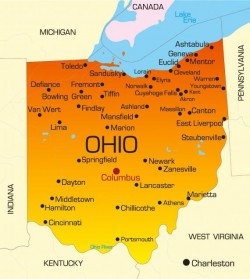When most people think of Ohio, they don’t really think of much of anything—the state has an unfair reputation as being very boring. Even with cities like Cincinnati, Columbus, and Akron, most people assume there’s not a lot to do in Ohio. These people would probably be very surprised to learn that the state is actually very LGBT friendly and is also a popular vacation spot for gays and lesbians.
An Underrated State
 Ohio is often very underrated within the LGBT community, but there’s no reason it should be. It may not have famous gay cities like New York or San Francisco, but many people say that Columbus is just as great. In fact, because it’s not as crowded or as expensive, many people prefer living in Columbus than on either coast. The city has a few different gay neighborhoods, plus Ohio State University brings many gay and lesbian students to the area. Many bars, art galleries, and restaurants round out Columbus and make it a great home. It’s no wonder that the city has the 15th largest LGBT population in the U.S.
Ohio is often very underrated within the LGBT community, but there’s no reason it should be. It may not have famous gay cities like New York or San Francisco, but many people say that Columbus is just as great. In fact, because it’s not as crowded or as expensive, many people prefer living in Columbus than on either coast. The city has a few different gay neighborhoods, plus Ohio State University brings many gay and lesbian students to the area. Many bars, art galleries, and restaurants round out Columbus and make it a great home. It’s no wonder that the city has the 15th largest LGBT population in the U.S.
Dayton is another very welcoming city. If you’re into the performing arts, you probably already know that Dayton is home to a world-class theater, ballet, and orchestra. The city also has a thriving LGBT nightlife and an extensive historical section. Both Columbus and Dayton are very affordable, too.
Ohio Rights
As with all states, same-sex marriage became legal in Ohio in June of 2015 with the Supreme Court decision in Obergefell v. Hodges. Prior to that, the state had passed a constitutional amendment banning same-sex marriage in 2004. Prior to the legalization of same-sex marriage, nine cities and two counties offered domestic partnerships, and it’s uncertain if those partnerships will remain valid or if the couples will need to transition into a marriage.
As far as adoption goes, both step-parent and joint adoption is legal for spouses, regardless of the gender of the spouses. The state does not, however, have any protection for orientation or gender identity other than the anti-discrimination policy that applies to state employees, which protects on the basis of sexual orientation only. However, a number of cities and counties have passed anti-discrimination ordinances that prohibit discrimination based on orientation in housing and employment. Dayton, in fact, includes transgender individuals in its ordinance. Neither orientation nor gender identity are listed in the state’s hate crime laws, nor does the state allow people to change their gender on their birth certifications.
Despite this, some areas of Ohio are quite legal and welcoming. Ask one of our LGBT real estate professionals about Columbus or Dayton and you’ll usually hear nothing but positives.
